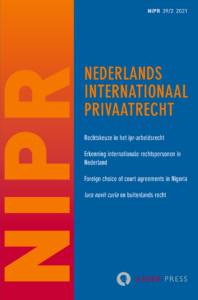Issue 2021(2) Dutch PIL journal
 The second issue of 2021 of Dutch PIL journal, including both English and Dutch language papers, has just been published.
The second issue of 2021 of Dutch PIL journal, including both English and Dutch language papers, has just been published.
It includes these papers:
K.C. Henckel, Rechtskeuze in het ipr-arbeidsrecht: enkele gedachten over het begunstigingsbeginsel / p. 251-273
This article discusses the preferential law approach that is enshrined in Article 8(1) Rome I Regulation. This provision limits the effects of a choice of law in the sense that the choice may not deprive the employee of the protection afforded to him by the mandatory provisions of the law that would have applied in the absence of a choice. It is generally accepted that the law that is most favourable to the employee merits application. The determination of this preferential law requires a comparison between the chosen law and the law that would have applied in the absence of such a choice. The article examines the method of comparison used throughout Dutch case law which shows that a preferential law approach is rarely applied. Instead, the majority of judgments apply the mandatory provisions of the objectively applicable, Dutch, law without further explanation. Since the application of the preferential law approach seems to be plagued by ambiguity, this article questions the desirability and practical feasibility of the comparison between the chosen law and the mandatory provisions of the law that would have applied in the absence of such a choice.
L.C.J. van Apeldoorn, Erkenning van internationale rechtspersonen in het Nederlandse privaatrecht / p. 274-291
This article examines the grounds for the recognition of the legal personality of international legal persons in Dutch private law, focussing in particular on foreign states and international organizations. Based on an analysis of the decision of the Dutch Hoge Raad (Supreme Court) in UNRRA/Daan, it is argued that the legal personality of international organizations is recognised by means of the (analogous) application of a rule, codified in Article 10:119 of the Dutch Civil Code, according to which the legal personality of a corporation depends on its personal law. When considering the personal law of international organisations, which is public international law including the terms of the founding treaty, decisive is not whether the organisation is an international legal person, but whether it is granted, on the basis of public international law, legal personality in the legal orders of its member states. The rule governing the recognition of the legal personality of international organisations is not applicable to foreign states because public international law does not imply or require that states are afforded legal personality in municipal law. Rather, it is argued, the legal personality of foreign states is recognised on the basis of an unwritten rule of Dutch private international law, originating in international comity, that attributes legal personality to foreign states. The application of this rule coincides in practice with the application of another rule also originating in comity, requiring as a matter of public international law that foreign states are granted standing to be party to legal proceedings before municipal courts.
Okoli, An analysis of the Nigerian Court of Appeal’s decisions on foreign choice of court agreements in the year 2020 / p. 292-305
In Nigeria valid commercial contracts between parties are treated as sacrosanct and binding by Nigerian courts. It is however uncertain (unlike in the European Union) whether a valid foreign choice of court agreement, which is a term of the parties’ contract, will be enforced by Nigerian courts. In this connection, the decisions of Nigerian courts are not consistent. Nigerian courts have applied three approaches to the enforcement of foreign choice of court agreements – ouster clauses, the Brandon test, and the contractual approach. This article analyses the approach of Nigerian appellate courts to the enforcement of foreign choice of court agreements in light of three Court of Appeal decisions delivered in the year 2020.
latest phds, summary: Stuij, Iura novit curia en buitenlands recht. Een rechtsvergelijkend en Europees perspectief (dissertatie Erasmus Universiteit Rotterdam, 2021) (samenvatting proefschrift) / p. 306-311
This contribution is a short summary of a PhD thesis defended at Erasmus School of Law on April 29th, 2021, on the legal maxim iura novit curia in relation to the application of foreign law in civil proceedings. The thesis is a result of a comparative research into Dutch, German and English law, as well as European law. It analyses, evaluates and recommends several approaches to the problem of foreign law in civil litigation. This contribution discusses, inter alia, the method of the thesis including its comparative approac